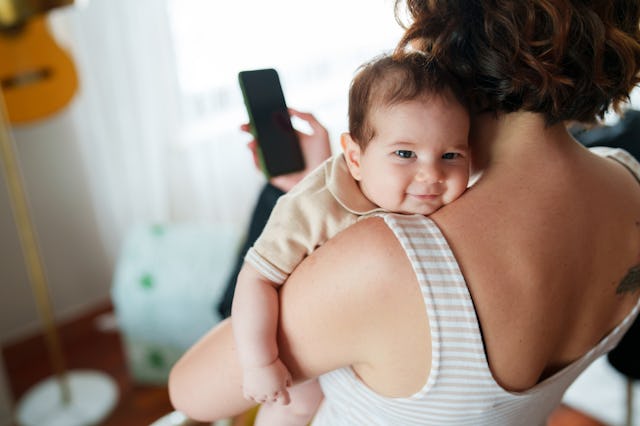New Study Finds “Momfluencers” Who Glamorize Motherhood Are Making New Moms Insecure
They found that moms tended to compare themselves in a negative light.

Turns out, the culture of “momfluencers” may do more harm than good for some new moms, according to a new study.
The findings, published in the Journal of Broadcasting & Electronic Media, suggest that polished or idealized portrayals of motherhood — i.e. clean house, happy kids, hair and makeup — shared on social media can increase anxiety and envy in new moms.
Researchers at the University of Nebraska-Lincoln surveyed 464 new moms working to understand if certain personality traits in new moms may make them more susceptible to the negative effects of idealized portrayals of motherhood shared online.
They found that those with a higher “social comparison orientation” tended to be more negatively affected by glamorized social media posts. Those same mothers also had a higher chance of becoming less confident about their own parenting abilities after internalizing these posts.
“We all have this tendency to compare, but some of us are more inclined to compare than others,” lead researcher Ciera Kirkpatrick said in a statement.
“If we know how these posts are affecting mothers and that they are more detrimental to certain moms, then that helps us, from a strategic health communications or health professional standpoint.”
Determining who may be more vulnerable to the negative impacts of social media will allow experts to intervene before the negative impacts begin.
Kirkpatrick also noted that the algorithmic turn from photo to video (i.e. TikTok, Instagram Reels) has reduced the number of perfect posts because there’s less ability to edit and stage.
“I think it was simpler, with a photo, to capture exactly what you want and leave out everything else,” Kirkpatrick commented.
“It’s a little bit harder to make sure everything’s perfect in a video, and I’ve seen more of a push for showing realistic portrayals of motherhood as I’ve been collecting these types of posts for the next study.”
However, moms susceptible to comparison are not totally free from feeling lesser with momfluencer video content.
She continued: “In some ways, there might be things that idealization is making worse for new moms. I have lots of examples of postpartum moms showing off their ‘must-haves’ — a $1,000 bassinet or a $300 bottle washer, these really expensive things — and that likely creates pressure on moms. Or the ‘typical day’ videos that show a postpartum mom meal planning or cleaning their house every night. That just feeds into the pressure.”
When I was a first-time mom, working through the ebbs and flows of postpartum life, I had to make the conscious decision to go through my following list on Instagram and unfollow several “momfluencers” that I had previously enjoyed. It was nothing personal. I just couldn’t look at one more sleeping baby in a Moses basket or workout routine to “bounce back” six weeks after giving birth. I felt cruddy about myself, comparing my life to those of the polished moms on the internet.
Apparently, I am not alone in this.